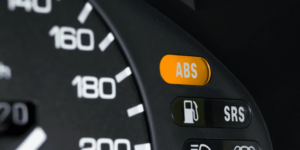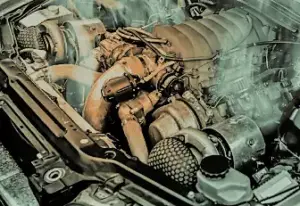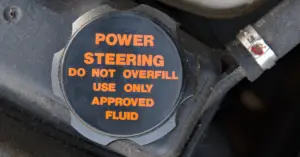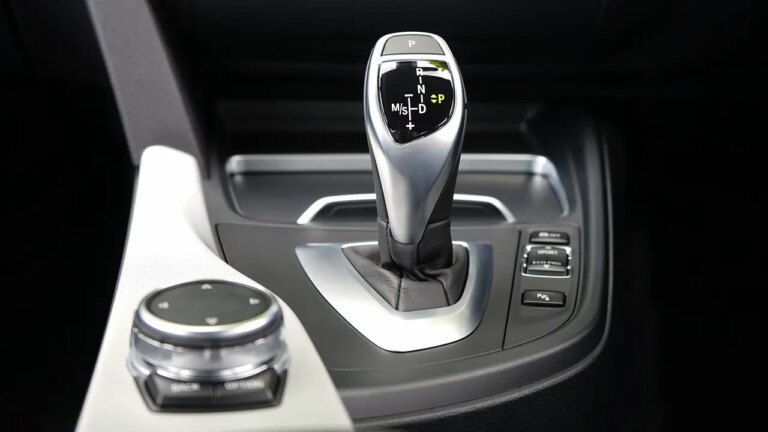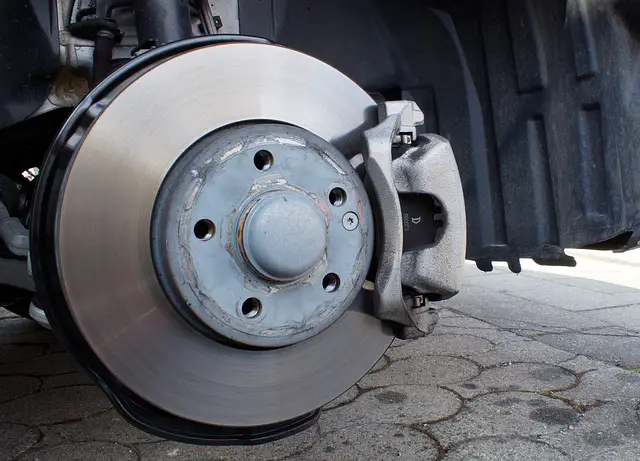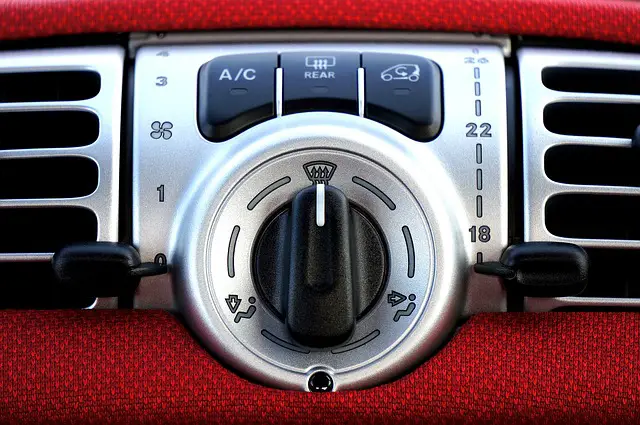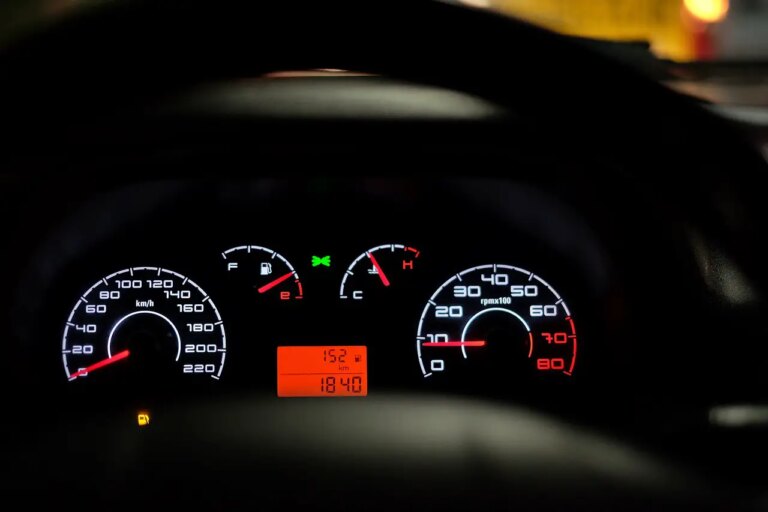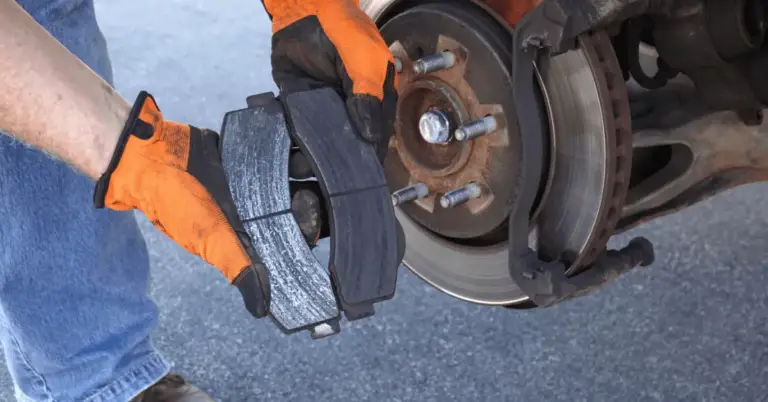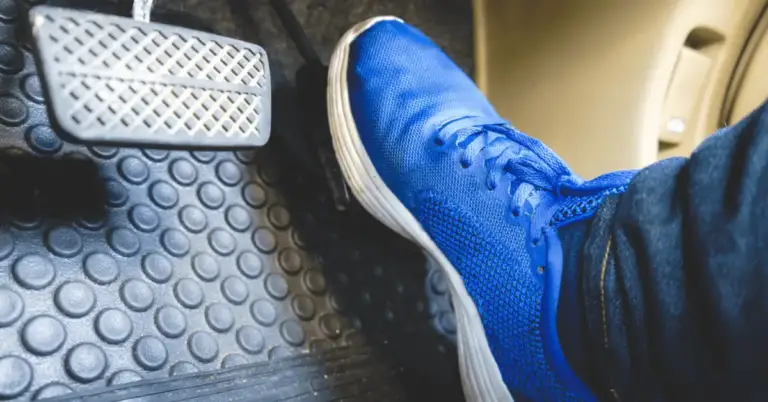It’s worrying when your steering wheel shakes when you brake. It’s the one time you want a smooth, controlled feel from the steering wheel. We’ll explore all the possible reasons below.
Briefly though,
Your car is shaking when you brake because either.
- Your car has worn brake components or
- You need to top up the brake fluid or
- Your Anti Lock Braking System (ABS) is faulty.
The most common reason your car steering vibrates when you push the brake pedal is that your brake pads are worn down.
1. Worn Brake Pads
There are two brake pads on each wheel, and they grip the rotor (brake disc) when the brake pedal is pushed down.
They generally will need replacing every 40,000 to 50,000 miles.
However, a lot depends on how your car has been driven over time. As we all know, if a vehicle is driven hard, the fuel economy also goes down. It’s the same principle for brake pads.
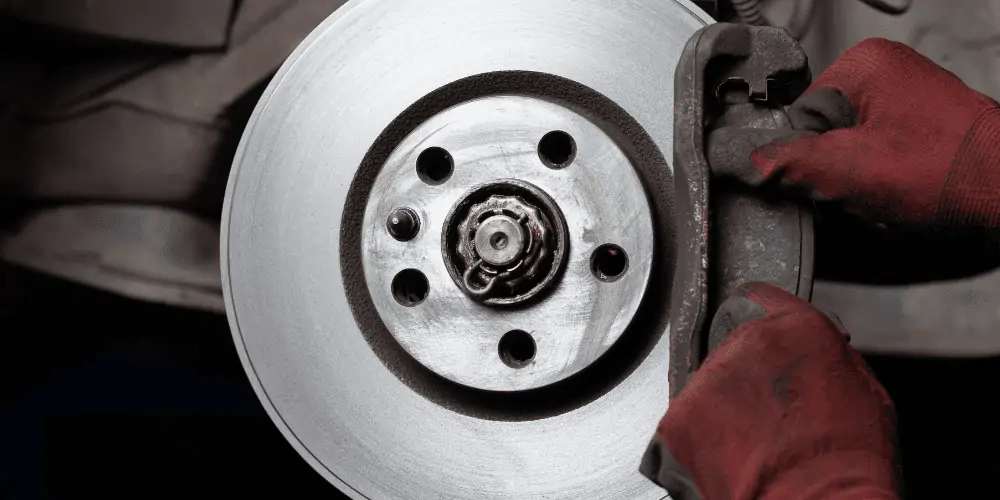
A set of brake pads being asked to grip onto the rotors (the circular disc of your brake set up) hard and fast will not last as long as a car is driven more slowly. Each time the brake pad grips on the rotor, it wears away slightly because of friction.
Do you hear a continuous squeal when you drive? This may be the wear indicator pin letting you know the brake pad is worn and needs replacing.
Brake pads are made from:
Ceramic- these are the most expensive standard brake pads as they are long-lasting and create very little noise when applied to the rotor.
Organic – the pads are the older type of pads that have existed for many years. They are made of a compressed compound of rubber, metal, glass, and fiberglass. Most cars still have these. When they wear, they can judder as they bounce off the rotor and often let off a metal scraping sound.
Metal – or semi-metallic. As you would think, these are mostly metal and often used in high-performance cars as they can absorb much heat generated under heavy braking.
The cost of a new set of brake pads ranges from $30 to $250. The large variation is due to the material they’re made from, the brand of the pad, and the make of the vehicle. Labor costs range from $100 to $150.
2. Warped Brake Rotors
Brake rotors are an essential part of your braking system, but like pads, they only last for a specific time before they need replacing. Once again, this depends on the style of the driver and the quality of the rotor that is on the wheel.
Generally, rotors will last for between 30,000 miles and 50,000 before needing replacing.
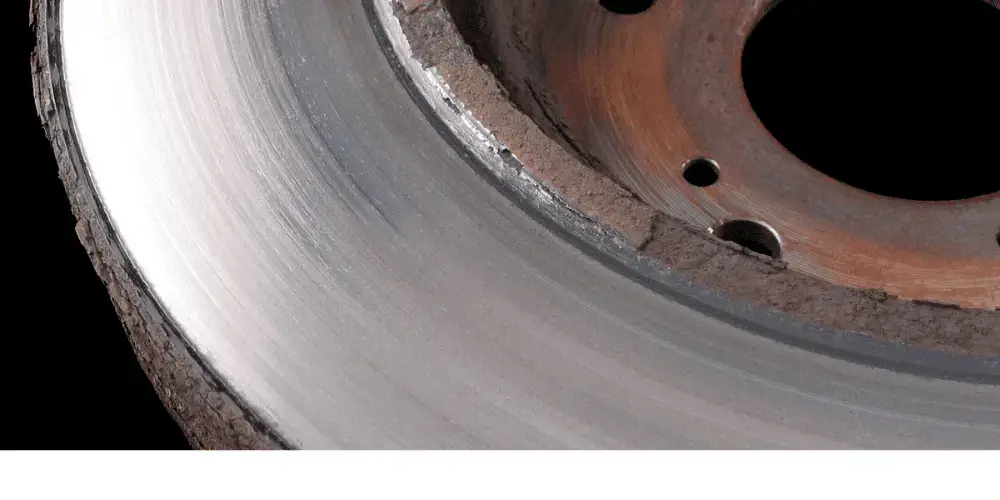
The pads will often need to be replaced simultaneously as they usually get worn together.
This can save on labor costs because it will mean that the wheel will only have to be removed once by the mechanic rather than having to do it a second time to replace the pads in the future. As pads can be pretty cheap, this can make financial sense.
Not only do rotors wear away, but they can also warp. This is caused by being heated rapidly because of friction when the pads grip and then cooled upon the pad release. This unevenness can cause the pad to jump off the rotor, which is very likely what you may be experiencing.
You’ll pay between $50 – $250 depending on the model of the car and the brand of rotors you have decided to have fitted. Labor costs are between $100 and $150.
3. Sticking Brake Caliper
The brake calipers are the final part of your braking system. Their job is to push the pads onto the rotors when the brake pedal is depressed.
If they get stuck, they can make your car shake when you apply the brakes. A seized brake caliper can destroy the pads and the rotors if left too long.
The brake caliper can often be salvaged and unstuck, so it is not necessary to have it replaced. The longer it’s left seized, the less chance of fixing it.
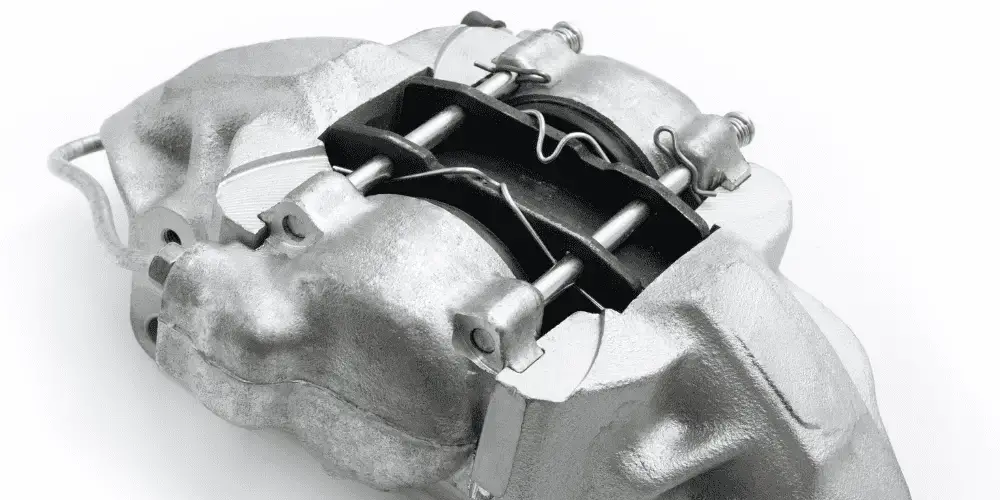
The brake caliper isn’t a part that regularly needs replacing, unlike the pads and rotors.
However, the constant demands on it to tighten and then release, along with the build-up of grime and debris from road use, can cause them to fail.
A replacement iron brake caliper costs between $150 and $300. An aluminum brake caliper costs between $350 and $800. The labor costs are an additional $125 to $200.
4. ABS Warning Light
Is your ABS light on, or has it been staying on longer when you first start your engine before going off?
The ABS is a complex system of wheel speed sensors. Readings are sent from these sensors to your car’s ECU -the car’s computer- where they are processed and acted upon.
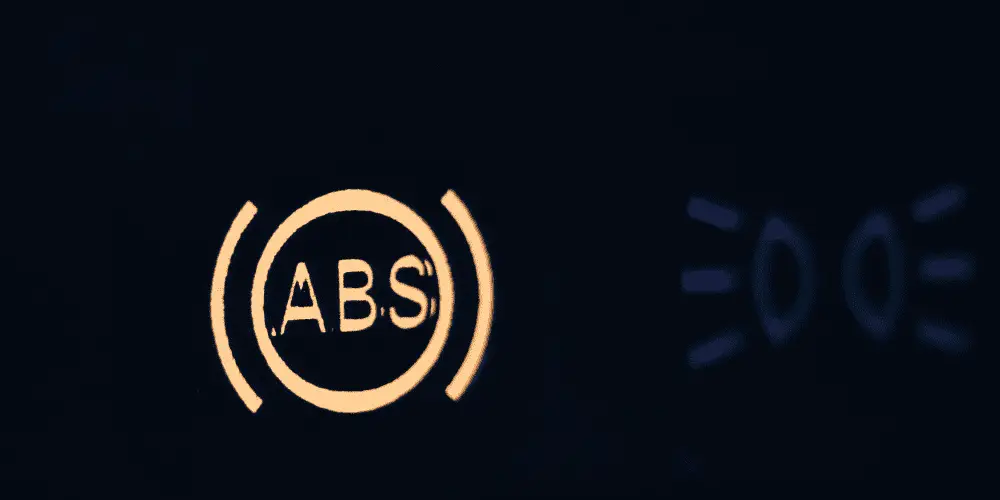
If you’ve noticed your steering wheel shaking when you are breaking, it might be that an ABS sensor is faulty.
A mechanic will read any error codes that the car is producing by plugging in an OBDII machine. Each time a car ECU recognizes a fault, it creates a code stored in its memory.
The OBDII machine reads these codes and identifies the problem so it can be fixed. A mechanic will charge $50 – $100 to do this check. Once a fault is specified, the repair can take place.
It’s difficult to estimate a repair cost for an ABS fault as it could be mechanical, electrical, or a combination of both.
5. Low Brake Fluid Levels
Brake fluid is hydraulic, which means it is used to increase the magnitude of force. In brakes, it increases the pressure on your braking system when the brake pedal is applied.
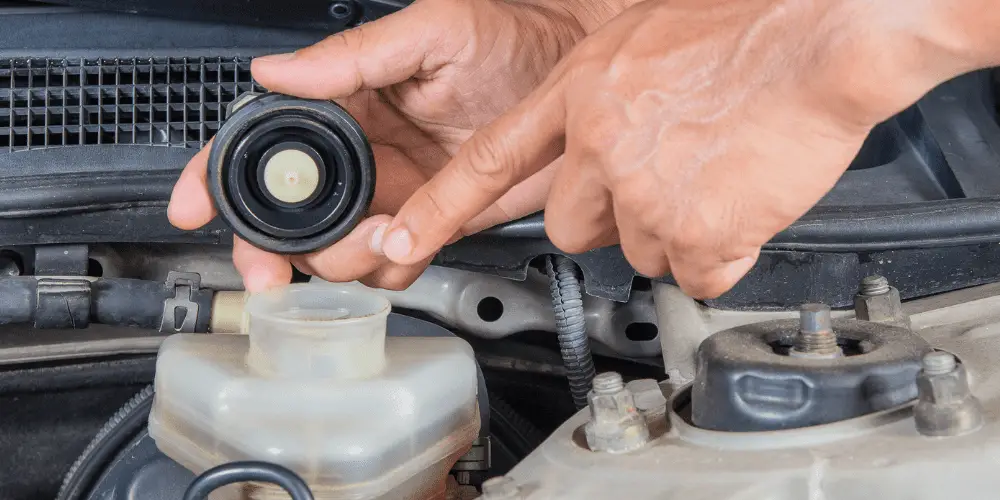
If there is not enough fluid in the system, the system struggles to stop the car.
You may also notice that it is harder to press the pedal and that your braking is less responsive. It will also make your steering wheel shake.
The good news is that brake fluid is cheap and easy to top up. You don’t need a mechanic or specialist parts to do this.
Under the hood, there are four of five reservoirs. The brake fluid one should have brake fluid written on it. If not, refer to the handbook to be sure. There is a max and a minimum level. If it’s low, top it up to the maximum, and that should fix it!
If this hasn’t resolved the problem, but your brakes and ABS have been checked, and they are not the culprit, you might need to change your brake fluid.
Some manufacturers advise brake fluid should be changed every two years as part of the maintenance program. If yours hasn’t been changed recently, it may have been contaminated with water which lessens its performance.
Often read next by other visitors: Steering Wheel Is Off Center But Driving Straight – Help & Advice
Why Does My Steering Wheel Shake When I Brake Downhill?

Your car is being asked to take more weight than if you were on a level road. You have an underlying brake problem that is being intensified by driving downhill.
Is It Safe To Drive If My Steering Wheel Shakes When Braking?
It would be best if you got your car inspected as soon as you noticed the problem.
It’s very unlikely to fix itself and will more likely get worse, become dangerous, and cost more money to fix later.
Why Does My Steering Wheel Shake When I Brake Hard?
When you brake hard, additional stress and pressure is being put on the braking system. The problem is there with your brakes anyway, but it is being exaggerated.
In conclusion
Steering wheel shake when you brake is almost always either because of worn brake pads and/or warped rotors, low or dirty brake fluid, or a seized brake caliper.
Does your vehicle shake at other times or only when you brake?
This is important as the answer can rule out many other faults.
If your car shakes at other times, too, there may be other causes that we cover in more depth in these three articles.
What Causes A Car Steering Wheel To Shake? Causes and Fixes
Why Does My Car Shake At Higher Speeds
Why Does My Car Shake When I Accelerate


